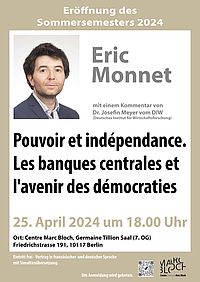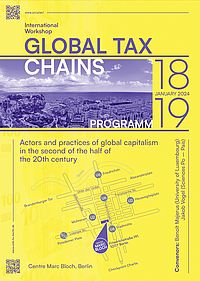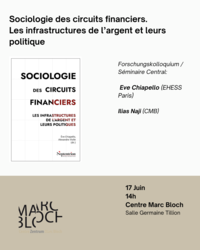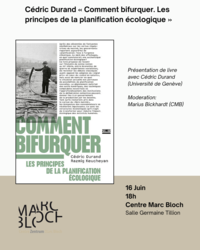Cycle économie
Cycle Économie / Wirtschaftsreihe
Avec son cycle économie, le Centre Marc Bloch se saisit, dans une perspective interdisciplinaire, d’enjeux sociétaux de tout premier plan. Contrairement à une perspective qui traite les activités économiques comme un espace autonome, les travaux présentés dans le cycle économie visent à reconnecter l’accumulation capitalistique et les marchés à leur historicité, à leur encastrement dans les sociétés, à leurs interactions avec des institutions de régulation et leurs conséquences sur les conditions de vie et de travail. Se posent, à travers les séminaires, conférences et journées d’étude proposés, les enjeux de légitimation de l’ordre politique, les dynamiques de globalisation, la recomposition de la protection sociale et in fine le modèle de société et l’avenir de la démocratie.
Post growth, banks and finance. June 6 and 7 2024
The themes of degrowth and post-growth are increasingly debated in the academic world. Research communities are studying them from a variety of theoretical perspectives and with a variety of objectives. To limit global warming and preserve planetary limits, an empirical consensus is emerging on the need for a significant decrease in the flow of materials extracted, circulated and discharged by economies, which is difficult to separate from a decrease in their GDPs.
A consequent stream of research exists on money and growth, but this literature focuses relatively little on the banking and financial sectors. Yet these sectors play a central role in the creation, destruction and circulation of currencies, which frame the possibility of climate policies (where to find the money? one of the answers lies in money creation, cf. the IRA in the USA). The institutions in these sectors, through their regulatory standards (capital investments according to risk levels) and business models (acceptable risk levels), constrain and direct the volumes of investments earmarked for "green" investments, for example in renewable energies, energy and resource-saving devices and technologies.
Banks are making "green" investments. These are monetary creations aimed at making activities more sustainable. The issue of transforming entire economies according to sustainability criteria is not currently considered by the banking and financial sector. The decline in the material flows of economies, for example, would be accompanied, depending on the sector, by a decline or growth in financing flows from banks and the finance sector. A number of questions can be formulated on the basis of these elements. For the banking and finance sector, they concern:
-the diagnosis of sustainability conditions in relation to material flows and GDP growth,
-the compatibility of sustainability with the business models and profit rates of the banking and financial sectors.
-the interweaving of the banking and financial sectors in the evolution of forms of capitalism "compatible" with the ecological transition.
-methodological and epistemological questions concerning the scientific, political and "future" character of forms of economic organization in the banking and financial sector, as called for by research currents on de/post-growth.
Organised by Ilias Naji
Conférence inaugurale - Eric Monnet 25. April 2024| 18:00

Eric Monnet présentera sa nouvelle publication: "Balance of Power. Central Banks and the Fate of Democracy" qui sera publiée en avril 2024. La présentation se fera en français et sera commentée par Dr. Josefin Meyer du DIW (Deutsches Institut für Wirtschaftsforschung).
International Workshop: GLOBAL TAX CHAINS 18. Januar | 14:00 2024

Actors and practices of global capitalism in the second of the half of the 20th century
As chains of wealth became global in the world economy (Seabroke&Wigan, 2022) so did tax strategies. These topics have gained increased attention in the last fifteen years as the crisis of 2007/2008 renewed the discussion on inequalities and (fiscal) justice. Humanities and Social Sciences played an important role in framing debates on this topic. Wealth was perhaps less produced by manufacturing cars or building houses than by moving capital across jurisdictions, creating multi jurisdictional spaces where national states, global companies, local financial plumbers and international organisations created, maintained and governed global tax chains. This workshop has a dual purpose. On the one hand, it intends to take stock of these ongoing international and interdisciplinary debates. On the other hand, it intends to deepen the historical dimensions to phenomena that are beginning to be well documented for today's world, but still sometimes lack temporal depth.
Organised by Benoît Majerus and Jakob Vogel at Center Marc Bloch Berlin
Colloque "Innovation sociale" 14 décembre 2023 | 09:30
Le concept d'innovation sociale s'est largement imposé au cours des deux dernières décennies dans le cadre des activités de l'OCDE et de l'Union européenne. La définition du terme diverge selon son contexte. Toutefois, une connotation normative est récurrente au sein des diverses définitions.
L'atelier, qui aura lieu de 9h30 à 16h30 au CMB, sera consacré au thème de l'innovation sociale du point de vue de la science et de la pratique dans une perspective franco-allemande et européenne. Une dizaine de scientifiques et de praticiens confèreront de ce thème en anglais. L'atelier se compose d'un exposé principal et de deux tables rondes. La conférence principale (Simone Baglione, Università di Parma) amorcera le sujet avec une approche européenne comparative, en présentant les différentes définitions et mesures de promotion de l'innovation sociale, ainsi qu’en délimitant le cadre conceptuel. Elle sera suivie de deux tables rondes sur les thèmes (i) de l'inclusion sociale des personnes handicapées et (ii) de la migration et du marché du travail.

